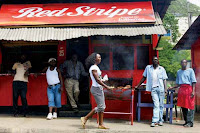Anita Draycott steps into the kitchens of Jamaica and finds that she can stand the heat
 “White men can jerk,” insists chef Walter Staib, a self-confessed expert on Jamaican food and the culinary ambassador to Sandals Resorts.
“White men can jerk,” insists chef Walter Staib, a self-confessed expert on Jamaican food and the culinary ambassador to Sandals Resorts.Indeed, the German-born chef, who began his career in Europe, has been jerkin’ and jammin’ elbow-to-elbow with local Jamaican cooks at jerk huts, church suppers and food stalls over most corners of this lush West Indian island, as well as foraging in the local markets, fruit and spice orchards, and rum and coffee plantations, for more than 30 years. The first inductee into the Caribbean Culinary Hall of Fame, Staib has extensively researched the roots of Jamaican cuisine at the University of the West Indies in Kingston.
 On a recent visit, Staib led our small group of ‘foodies’ on a culinary island romp. The heat was on at our first stop, Billy’s Roadside Canteen in Middle Quarters on the south coast. Billy was tending about 10 Dutch ovens as they simmered over a pimento wood fire. At this Jamaican version of a drive-through, locals pull over, roll down their windows and order lunch.
On a recent visit, Staib led our small group of ‘foodies’ on a culinary island romp. The heat was on at our first stop, Billy’s Roadside Canteen in Middle Quarters on the south coast. Billy was tending about 10 Dutch ovens as they simmered over a pimento wood fire. At this Jamaican version of a drive-through, locals pull over, roll down their windows and order lunch.According to Staib, the cost depends on how you’re dressed and what kind of car you’re driving. For tourists like me that translates into about $5 for a dish of rice and peas, Billy’s famous pepper shrimp and a scoop of surprisingly tasty peanut porridge. These traditional island recipes have been passed down, literally by word of mouth, from Billy’s grandmother.
As we rattled past several fruit stands and even more rustic rum shacks, Staib chatted about Jamaica’s culinary heritage. Both English and Spanish plantation managers planted starchy crops, such as breadfruit, yams and cassava, that were cheap fodder for the slaves. Jamaica’s national dish, ackee and saltfish, probably began when a slave brought an ackee seed from his native Africa and either dropped or planted it. The fruit is related to the lychee and has the texture of scrambled egg. Back in the 1700s Newfoundland sailors traded dried salt cod to Jamaicans for rum. Salting the fish was an ideal way to preserve it in the days before refrigerators.
In addition to nutmeg, allspice, ginger and mace, 10 species of peppers grow here, the most important being the fiery Scotch bonnet used in jerk. More than a spice, Scotch bonnet is also a preservative. The original jerk recipe called for marinating the meat, chicken or fish in a rub of Scotch bonnet, thyme, onion, scallions, garlic and allspice, then cooking it slowly over the ashes from a pimento wood fire. The word ‘jerk’ probably originates from charqui, which means ‘dried meat’ in Quechuan.
By the time our culinary history lesson was over we had reached Little Ochie on the beach in Alligator Pond. A blackboard menu lists the catches of the day. Order what you want and then chill out on the beach with a cool drink until it’s served. We feasted on lobster with lemon garlic butter, jerked crab and conch, as well as festival, Jamaica’s caloric version of cornmeal fritters.
The next day we drove to Port Antonio on the north coast for a river rafting adventure on the Rio Grande. Miss Betty, a lady of indeterminate age, operates a riverside canteen. Depending on the day, you might sample her famous pepper pot soup, goat curry, chicken fricassee and callaloo stew. Be sure to save room for the coconut-ginger cookies. Chef Staib credits Miss Betty, with teaching him all he knows about real down-home Jamaican food. One morning Staib organized a coffee tasting at Firefly, the cliff-hanging estate in Port Maria, where playwright Noël Coward lived, entertained royalty and movie stars and was buried in 1973. In 1728 Sir Nicholas Lawes, former governor of Jamaica, introduced the first coffee plants to the island. Now some of the world’s best and priciest java grows in the highlands of the Blue Mountains. You can drink the mellow brew with a clear conscience, as the farmers are paid top dollar and the crops are rotated to protect the soil.
By now I was a true jerk junky, hooked on the bold, spicy flavours of Jamaican cuisine. Converts like me can take home a line of Lifestyle products, including several jerk and barbecue sauces and Blue Mountain coffee. So now you can crank up your Bob Marley tunes, fire up your grill and enjoy a Jamaican reggae party in your own backyard.


No comments:
Post a Comment